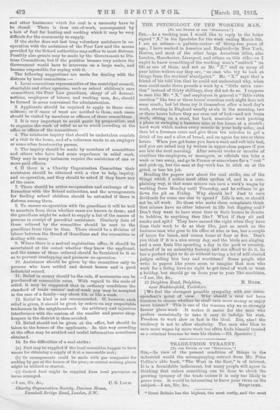THE PSYCHOLOGY OF THE WORKING MAN.
[TO THE EDITOR OP THE "SPECTATOR."]
Slit,—As a working man I would like to reply to the letter signed " X." in the Spectator for the week ending March 9th.
I am an artisan—a pattern-maker—of thirty-two years of ago; I have worked in America and England—in New York, Boston, and most of the other large American cities, also London, Manchester, Liverpool, and others ou this side—so I ought to know something of the working man's "outlook" on life as one of them, and not as Mr. "X." and so many of your letter-writers say they are, "as ones who try to look at things from the workers' standpoint." Mr. "X." says that a friend of his told him that he could not understand why, when men could make three pounds a week by a "little extra exer- tion" instead of thirty shillings, they did not do so. I suppose to men like Mr. " X." and employers in general a " little extra exertion" like two or three hours' overtime each night does not seem much ; but let them try it themselves after a hard day's work, starting in England usually at six in the morning, two or three hours before they are even out of bed—and not brain work, sitting on a stool, but hard, muscular work pushing a plane or swinging a hammer nine or ten hours at a stretch ; hard work which makes every muscle in your body ache ; and then let a foreman come and give them ten minutes to get a drink of tea and a slice of bread, and on again for two or three hours. When you get home you have a wash and roll into bed, and you aro called lazy by writers in upper-class papers if you are late the next morning. After several weeks or months of overtime the employers, or managers, or officials can take a week or two away, and go to France or somewhere for a " rest " and pick-up, but the man at day-work has to stick on at the grind, or lose his job.
Reading the papers now about the coal strike, one of the things which I notice most often spoken of, and in a com- plaining way, is that some miners can earn a week's wages by working from Monday until Thursday, and he refuses to go down the pit on Friday. Why should he P Just to earn dividends for some one else to spend P Life is not, or should not be, all work. Do those who make these complaints think that miners have no other interest in life but digging coal P Don't they want to have some time in their homes to devote to hobbies, to anything they like P What if they sit and smoke and spit P They have earned the right when they have done their work to do as they like, just as much as the business man who goes to his office at nine or ten, has a couple of hours for lunch, and comes home at four or five. Don't you think if it is a nice sunny day, and the birds are singing and a man feels like spending a day in the park or country, instead of in an unhealthy factory, and can afford to do it, he has a perfect right to do so without having a lot of self-elected judges calling him lazy and worthless P Some people who write to papers like yours .seem to imagine that men who work for a living have no right to get tired of work or want a holiday, but should go on from year to year like machines. —I am, Sir, &c., 12 Deighton Road, Deighton, B. HUES. near Huddersfield, Yorlcshiro.
tWe feel the strongest possible sympathy with our corre- spondent's point of view. Why should a man not have freedom to choose whether be shall earn more money or enjoy more leisure? This is one of the reason& why we so strongly favour piece-work. It makes it easier for the man who prefers occasionally to take it easy to indulge his wish. Freedom to work slow or fast is the ideal. But, alas the tendency is not to allow elasticity. The man who likes to earn more wages by more work too often finds himself treated as a criminal because he uses his choice.—Ed. Spectator.]






































 Previous page
Previous page